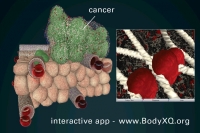Micronutrients Effectively Control Multiple Steps In Breast Cancer
Excluding skin cancer, breast cancer is the most common cancer in women in the US, and about 1 in 8 women are likely to develop it during their lifetime. The American Cancer Society estimates that in 2014, about 232,670 new cases of invasive breast cancer, and 62,570 of noninvasive (in-situ) breast cancers will be diagnosed in the US. Worldwide approximately 1.38 million new cases are diagnosed and 458 000 deaths occur from breast cancer each year.
While women are aware of breast cancer, very few of them take any steps towards prevention. Every year, October is designated as Breast Cancer Awareness month and the campaign is focused on increased attention to risk factors, early detection, and care. Breast cancer is much less common in males and it contributes to 1% of all breast cancers. However, this number is rapidly increasing which should be an important aspect of breast cancer education. Most male breast cancers are caused by continuous exposure to excessive levels of radiation, the female hormone estrogen contained in various foods, plastics and other chemicals. Due to lack of awareness, male breast cancer is often diagnosed at a later stage and it is therefore difficult to treat.
The aggressiveness of the cancer is determined by an ability of cancer cells to spread to distant organs in the body, and the collagen matrix surrounding the cancer cells plays a critical role in the spread of cancer. An ample amount of vitamin C and other nutrients in the diet are essential for the strength and stability of the collagen tissue. While diet is the only vitamin C source for humans, cancer patients tend to have very low vitamin C levels due to poor diet and treatment side effects, which overall impairs the body’s ability to fight a disease.
Therefore, we evaluated the effects of vitamin C supplementation on development of breast cancer in a unique strain of mice, which lost their ability to produce vitamin C1. We found that unlike the control group of mice, the vitamin C supplemented mice developed smaller tumors by 28%, with fewer areas of necrosis. More importantly, the tumors were surrounded by a dense collagen capsule thereby minimizing their potential of metastasis. In addition to promoting metastasis of cancer, extensive inflammation is also a reason for weight loss, fatigue, and muscle wasting in cancer patients. Our results showed that unlike the control group, vitamin C supplemented mice did not lose weight and their levels of an inflammatory marker was lower by 85%.
Since chemical exposure is one of the important factors in the development of breast cancer, we evaluated a specific combination of micronutrients containing vitamin C, lysine, proline, green tea extract and others on the development of chemically induced mammary tumors in rats2. We observed that the supplementation of micronutrients effectively reduced the tumor occurrence and lowered the number of tumors by 68%. Moreover, the tumors were smaller and showed less ulceration indicating a stronger collagen capsule and less metastatic potential.
Despite a variety of expensive treatment options and the availability of pharmaceutical drugs, a long-term outlook for cure of breast cancer remains poor. While all the efforts to build breast cancer awareness in October focus on detection and treatment of breast cancer, it is also important to emphasize the significance of micronutrients in this frightening disease. Our scientific results clearly indicate that specific micronutrients have a real potential in effective management and natural prevention of breast cancer.
- J. Cha, et al., International Journal of Oncology 2013, 42: 55-64
- M.W. Roomi, et al., Breast Cancer Research 2005, 7:R291-R295
